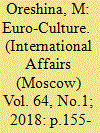| Srl | Item |
| 1 |
ID:
106119


|
|
|
| 2 |
ID:
158179


|
|
|
|
|
| Summary/Abstract |
WITH ITS ECONOMIES SHAKEN by financial woes and its system of fundamental values - democracy, the rule of law, and human rights - watered down, the European Union attaches special importance to cultural affairs, seeing them as the core of its foreign policy and the basis for its social and economic development.1 Before 1992, cultural and creative industries in the EU had been under the exclusive jurisdiction of member states. However, after the Treaty of Maastricht was signed, cultural policy became the prerogative of EU authorities, speeded up the revision of the EU's image, was one of the motives for reconsidering the European unity idea, which was rapidly losing its popularity, and, in a sense, counterbalanced European integration projects.
|
|
|
|
|
|
|
|
|
|
|
|
|
|
|
|
| 3 |
ID:
164213


|
|
|
|
|
| Summary/Abstract |
THE DELIBERATE DESTRUCTION of architectural monuments and works of art has a history that runs into millennia. The ravaging of Rome by the Gauls in 390 B.C., the demolition of churches during the 17th-century civil war in England, the methodical bombing of historic buildings during World War II, the destruction of cultural monuments in northern Cyprus after the Turkish invasion of it in 1974, the 1991 bombardment of the old part of Dubrovnik, a city that the United Nations Educational, Scientific and Cultural Organization (UNESCO) has had on its World Heritage list since 1979, the smashing by the Taliban of two giant statues of Buddha in Afghanistan's Bamyan mountains in 2001, looting and illegal archaeological excavations in Iraq after 2003, and the destruction of cultural objects by Islamic State (ISIS) in Iraq, Syria and Libya1 are just a few examples of the outrages that have deprived world civilization of cultural gems and have supplied the black market with antiquities.
|
|
|
|
|
|
|
|
|
|
|
|
|
|
|
|
| 4 |
ID:
156344


|
|
|
|
|
| Summary/Abstract |
ON MAY 6, 2017, the House of European History (HEH)1 opened in the Belgian capital to much fanfare. It is nothing less than a landmark project of the European Union for promoting the history of Eurointegration ideas and EU European values. More than ten years were needed to bring the project to fruition under the leadership of Hans-Gert Pöttering (Germany), President of the European Parliament from 2007 to 2009.
|
|
|
|
|
|
|
|
|
|
|
|
|
|
|
|